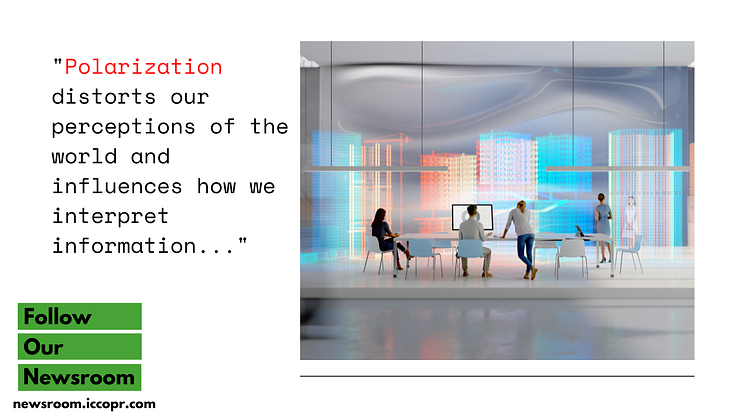
Blog post -
Poles Apart on Polarization
Written by: Laura Osborne
Democrat or Republican. Nationalist or Unionist. Pro or anti pineapple on pizza. Human beings are naturally groupish creatures who tend to like those who agree with them, and often dislike those who do not. Rising polarization and hostility between groups has become the subject of intense study, principally in the US – though there is much to learn from the rest of the world.
Today, polarization is (mainly) about groups. Not issues. Feelings, rather than facts.
In polarized times, groupishness can affect people’s judgement in unexpected ways. If you are a doctor, the course of treatment you recommend for a patient may well be influenced by your own politics and perception of their likely political leanings. If you are a manager, the same consideration will shape your hiring decisions – more so, in some circumstances, than considerations of race. We select those we choose to listen to, from individuals to the media, according to their political viewpoints. We are less likely to believe a criminal allegation, such as one of sexual assault, if it is brought against someone who belongs to our ingroup. There is no part of our lives, in fact, that goes untouched by the influence of these identity-based partisan labels.
We can all view ourselves as holding multiple identities that may crosscut one another: ‘mother’, ‘British’, ‘nurse’, ‘progressive/conservative’. As these identities become subsumed within labels that carry with them implications about wider attitudes and values – for example, ‘gun owner’ or ‘quinoa eater' – they can make us feel either attraction to or repulsion from others. These forces can be so strong it has the effect of creating otherwise unrelated divisions. So, issue-based differences rapidly become differences of social identity. When that happens, people increasingly dislike and distrust those from an opposing side, irrespective of whether they disagree much on a specific issue. Partisan labels come to act as proxies for differences in beliefs, values and behaviour that go far beyond political considerations.
Why polarization matters for communicators
This matters because polarization distorts our perceptions of the world and influences how we interpret information. Italians believe unemployment rates are more than four times higher than they actually are. British people overestimate the immigrant population of the UK by 54 per cent. People think they hold accurate views, but often they do not. They believe themselves able to process and evaluate information objectively, but in reality, we all struggle to do this, particularly if an objective assessment would place us out of step with our group. And once polarization sets in, it triggers changes in how we assess information and expertise. We downplay the role of experts and choose team members based on their political identity rather than their skill, even in the most basic of tasks.
So why do we do it? Membership of a group confers a feeling of safety and helps us make sense of the world. It also brings significant emotional benefits in the forms of pride and self-esteem. It reduces uncertainty. At the same time, it fulfills the natural human inclinations to, on the one hand, be superior and win, and, on the other, denigrate and defeat. Broad partisan labels that identify ‘us’ – the ingroup – and ‘them’ – the ‘out- group’ – are bandied about in all sorts of contexts, and not just political. Our loyalty to the group poses a huge challenge to society, causing us to interpret the same sets of facts in entirely different ways, and creating entirely different visions of the same realities.
The costs and catalysts of excessive polarization
And in the real world, the impacts are serious. Where does polarization leave the intellectual diversity that leads to innovation? Or good governance and decision-making? A society in which trust has broken down can be simultaneously volatile and ineffective. Healthy conflict – where different views can be aired, debated, and resolved – is a vital part of how we live, and it occupies a place at the core of a modern democracy, but there are huge risks if partisan conflict becomes all-encompassing, as it eliminates space to engage across the divide.
Our propensity to polarize is increasing, thanks to socio-economic circumstances, technological changes and a rising sense of uncertainty deepened in numerous financial shocks, which have left many people financially insecure and exacerbated the divides between the haves and have-nots.
Access to ever-increasing quantities of information, often of dubious provenance, has made us more reliant on messengers and less able to evaluate a message. Trust in our institutions has plummeted, opening the door to populist leaders and governments that offer to step in and fill the void. Our online world, while creating the opportunity for many new networks and connections, has also set up virtual barriers and a distancing effect that allows us to reject or avoid, rather than engage with, the views of those with whom we disagree. To make matters worse, the partisan online world has been monetized, rewarding those who put out emotionally charged content designed to attract attention.
But a continuously worsening picture is not inevitable. Polarization has risen and fallen back before. The question is - what can we learn from that? How can we reshape our institutions, our groups and, ultimately, ourselves? Political parties can function as effective bulwarks of authoritarian leaders who have little respect for democratic norms, as the GOP did so effectively with Henry Ford in the 1930s and failed to with Trump. Policy can support the creation of spaces of common ground (the closure of pubs in the UK has been tied to a growth in the far right) and ways to express opinion. Political leaders can reaffirm norms that support constructive political engagement across the aisle. Communicators can be mindful about the stories they tell, consciously using them to unite rather than divide.
It is easy to take a pessimistic view of our polarized and polarizing world. It is certainly the case that division will never go away completely and that a degree of division and disagreement is healthy. It stimulates debate and innovation and challenges groupthink. For some, particularly those structurally excluded from access to the levers of power, adopting a more extreme position is a crucial weapon in what for them is a limited armory of options to bring about change. But, without a doubt, an elevated level of polarization can be destabilizing and dangerous. It is this we must counteract. Though, since we are all part of the problem, we all have the capacity to be part of the solution.
This is an edited extract from Poles Apart, authored by Ali Goldsworthy, Laura Osborne, and Alex Chesterfield, and published by Penguin Random House – out now in Paperback.

